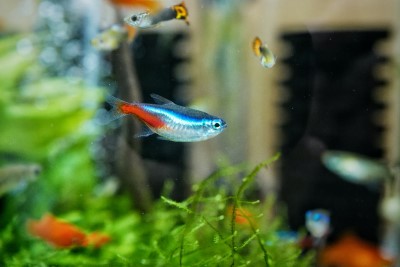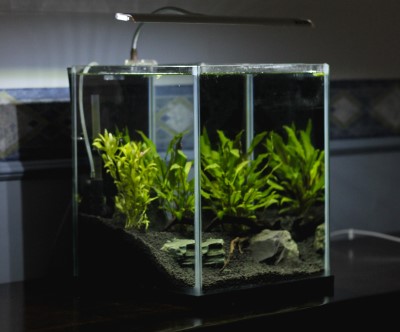
4 Things you want to avoid if you’re sleeping with a fish tank in the bedroom
By Jason Wooden, PhD | Last updated: August 28, 2024
Sleeping with a fish tank in your bedroom can be enjoyable and beneficial if it’s done the right way. The biggest concerns are excessive noise or light, unpleasant odors, and mold exposure which can trigger allergies or asthma attacks. Fortunately, there are remedies for all these of issues if you make the right adjustments.
So, you’re wondering about sleeping with a fish tank in the bedroom?
We love our fish yet we love our sleep too which is why it’s no surprise you have questions about keeping a fish tank in your bedroom.
Fish are the most popular pets in the US with nearly one in one in eight households owning aquarium fish. They’re also popular in many other countries.
Our love of fish tanks is due in part to the convenience of the hobby but there’s also the pure joy and fun from having a beautiful aquarium setup.
Many people have kept fish tanks in their bedroom, including myself and friends I know.

I kept a 50 gallon tank of cichlids when I lived in a small studio. I don’t recall having any issues with it, but maybe I was young and didn’t think about it too much.
When I moved into a bigger apartment, I started keeping my fish tank in the living room but that was because it made more sense. Now that I have a family and live in a house, the fish tanks are all downstairs.
All the same, I can understand if you’re wondering if there are any downsides to keeping your fish tank in the bedroom. It’s a question you’ll find online in various fish forums.
And maybe keeping your fish tank in the bedroom is your only option.
We know that one in three people struggle with insomnia worldwide but it’s hard to say how big of an issue fish tanks since no one tracks that.
Is it REALLY bad for your sleep or health?
Can sleeping with a fish tank in your bedroom make you sick?
Are there any downsides for relationships or anyone else who’s sharing the space with you?
We’re going to take a look at the positives, some of the more likely issues you may run into, and what you can do about them if you decide to sleep with a fish tank in your bedroom.

The benefits from sleeping with a fish tank in your bedroom
There are lots of positives if you keep a fish tank in your bedroom:
Entertainment
I’ve already mentioned the fun and joy from having a fish tank. They’re beautiful and can offer endless hours of entertainment.
Relaxation
Fish tanks are pretty relaxing which makes them a great way to unwind at the end of the day and get ready for bed. That’s a big plus since stress and anxiety are among the most common issues for poor sleep.
Manypeople find watching the fish and the soothing sound of the water calming.
In fact, one study found that staring at water all by itself can calm the body.
Physical and mental health benefits
Research has shown that watching a fish tank can lead to improvements in both mental and physical wellbeing. This includes improvements in blood pressure, heart rate, and mood.
Would you believe one study found that watching a fish tank could reduce heart rate by as much as 3% in just 10 minutes?
Sleep-friendly activity
Watching a fish tank is way more sleep-friendly than social media, texting, YouTube, or late-night TV shows. Did you know that electronic screens emit bright blue wavelength light which tells your brain it’s time to wake up?
Also, it’s easy to go down a rabbit hole online and stay up hours past your bedtime.
White noise
Some people find that the steady sound of the fish tank is great background white noise which can mask other nuisance sounds.
Again, what if sleeping with a fish tank in the bedroom is your only option? Maybe you live in a studio apartment or there isn’t a great spot to keep it somewhere else where you live.
Well, it’s time to look at some of the more likely issues you may encounter.

The 4 Issues you may run into if you sleep with a fish tank in your bedroom
Okay, we’ve talked about all the positives that come with bedroom fish tanks. Now, we’ve got to take an honest look at some of the potential downsides.
First off, a bedroom fish tank can be an issue for both you and anyone else who’s sharing the space with you. Secondly, it’s not just your sleep, but also other health issues to think about.
So, it’s well worth thinking through these downsides and coming up with a game plan if you’re going to keep a fish tank in the bedroom.
Issue 1: Excessive Bedroom Light
For optimal sleep, sleep experts recommend you keep your sleep environment dark. Excessive light from a bedroom fist tank could make it harder to fall asleep and stay asleep.
Whether it’s an issue would depend on how strong the lighting is, when it turns on and off, and your sleep schedule.
This is likely not a problem for most people unless you sleep off hours or fall asleep without turning off your tank lights.
There are other downsides to excessive fish tank light like unwanted algae growth.
What you can do:
This one is an easy fix. Set a timer so that the lights automatically turn off before your bedtime.
You can also wear a face mask if your sleep overlaps with when your tank lights are set to be on (for example, you work swing shift and want to keep your salt water tank on a regular schedule).
Issue 2: Excessive Noise
Sleep experts also recommend you keep your sleep environment quiet. Some aquarium setups can be quite noisy with pumps, power heads, filtration systems, and splashing water.
Whether this one is a problem for you likely depends on your aquarium setup, whether you’re a heavy or light sleeper, and the exact location of your tank.
As mentioned earlier, some people actually find the sounds of their fish tank a comforting source of white noise. However, if you’re very sensitive to night sounds you’ll need to make some adjustments.
Our tanks are downstairs but we can certainly hear them when something goes wrong.
What you can do:
- get the quietest pumps you can
- keep your system running smooth with regular maintenance
- adjust your fish tank water volume to minimize splashing
- keep the pump and other noisy equipment in an enclosed cabinet below the tank
- make sure the tank is not right next to you
- try ear plugs
- try white noise
Learn more: Household fans for white noise
Issue 3: Unpleasant Odors
Let’s be honest. Even the best of fish tanks can have bad days where the water is off, especially if you get behind on the water changes.
Other reasons a fish tank can get smelly include:
-decomposing food
-decomposing plants
-excessive biowaste
-dead fish
And some of the water conditioners used can be pretty smelly if spilled.
Studies show that room odors can affect sleep.
This odors will be more noticeable if the tank is in a small, enclosed area such as a bedroom or studio.
What you can do:
- regular water changes and tank cleaning
- remove dead fish or decomposing plants promptly
- add a carbon filter (be sure to regularly replace it)
- be careful with chemicals (maybe store them in a separate place)
Issue 4: Excessive Moisture and Mold
This is by far one of the bigger concerns if you’re sleeping with a fish tank in a bedroom.
Depending on the size of your aquarium setup and where you live, quite a bit of water can evaporate on a daily basis. With larger tanks, the humidity can be pretty noticeable as soon as you enter a room.
If you’re wondering if a fish tank in your bedroom can make you sick, it can if it leads to excessive moisture. Humidity and warmth are ideal conditions for mold which can grow undetected on all sorts of surfaces.
For some people, inhaling or touching mold can cause allergic reactions or asthma attacks. Mold can also cause fungal infections and can irritate the eyes, skin, nose, throat, or lungs.
To prevent indoor mold growth, the EPA recommends you keep your indoor humidity below 50%.
What you can do:
- monitor your indoor humidity level
- keep a lid on your tank to minimize evaporation
regularly ventilate your room - keep furniture away from walls so the air circulates
- use a dehumidifier (air conditioner in hot humid climate)
- regularly vacuum and clean your carpet
- promptly deal with any fish tank spills onto carpeting
- switch from carpets to bare floors
Learn more: Guide to mold, moisture and your home (EPA)

Other things you should do for your bedroom, sleep, and health
Sleeping with a fish tank in the bedroom isn’t the only issue for your sleep. There are lots of things that can affect the quality of your sleep, even without a fish tank.
That makes it important to practice good sleep hygiene, the everyday things you can do that sets the stage for deep restful sleep during the night.
For better sleep hygiene, sleep experts suggest you:
- Keep consistent wake up & sleep times
- Avoid naps
- Exercise during the day
- Avoid large meals, alcohol, or stimulants such as caffeine before bedtime
- Maintain a regular bedtime routine
- Avoid using TVs, laptops, or other electronics before sleep
- Keep your bedroom dark, cool, quiet, & relaxing
It’s also worth getting a checkup since many underlying health issues can cause sleep problems. Did you know diabetes, heart disease, chronic pain, arthritis, and asthma can cause sleep issues?
Finally, a doctor can help with any concerns you may have about allergies or asthma.
Learn more: When To See An Allergist (ACAAI)
You may also be interested in:
How to take back your sleep from allergies
9 things that can help you’re using CPAP with allergies
9 things to try if a cat won’t let you sleep
A Practical guide to sleeping with a dog
Pracitical remedies for when a barking dog wakes up a baby
Sleep Checklist: find out what else you can change
14 remedies for when you’re too lonely to sleep
16 things to try if you’re too cold to sleep
7 things to try if your phone keeps waking you up
16 Things to try if you’re too cold to sleep
12 Things to try if a noisy neighbor is keeping you from sleeping
Sources:
1. “Aquarium Fish”, Florida Department of Agriculture and Consumer Services website
2. ‘World Sleep Day Talking Points”, World Sleep Society website
3. “Stress Reduction, Tropical Fish and Aquariums”, Allan Schwartz, MentalHelp.net
4. “Aquariums deliver health and wellbeing benefits”, 2015, ScienceDaily
5. “Mold and Health: How do molds affect people?”, EPA website
6. “You Can Control Mold”, CDC website
Connect with us:
About Us
Better Sleep Simplified® was founded as a place for you to get clear and well-researched information.
Our goal is to make sure you know about your options so that you take action sooner rather than later.
Check us out on YouTube:
Watch and Learn
Helpful sleep tips, interesting sleep facts and statistics you want to know about
Affiliate Disclosure
This site is a participant in the Amazon Services LLC Associates Program and other affiliate advertising programs designed to provide a means for sites to earn advertising fees by advertising and linking to them.
Important: BetterSleepSimplified.com is for informational purposes only and is not intended or implied to be a substitute for professional medical advice, diagnosis, or treatment. Always consult a physician for sleep and health concerns. See additional information.
